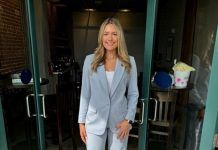The National Conflict Resolution Center, based in San Diego County, hosted a virtual dialogue on March 25 to discuss women in politics in celebration of Women’s History Month.
Co-moderated by resolution center Community Circles Specialists Ashley McGuire and Karla Broady, the event featured guest speakers Amy Kroll of the Women’s Campaign School, and political activist and Women of Color Roar Media founder Angela de Joseph who discussed how to gain political parity and lift women up into elected roles.
The virtual event was structured to be as interactive as possible, with short talks from both speakers and several small group breakouts loosely directed by the moderators to encourage conversation between attendees.
All four of the moderators and speakers agreed that women often find their way into politics as a natural development from volunteering at a local level and being active in their community, then went on to encourage local attendees to seek out volunteer opportunities as a first step on the political pipeline.
“I think there is a path and women are more likely to start on the school board, move to city council and then up the ranks. Men wake up and want to run for Congress where women often serve on something like the Parent-Teachers Association board first, and that can make them better leaders,” de Joseph said.
Kroll said recognizing people have freedom over their own time and can direct their efforts toward a ‘passion project,’ in politics was something she learned from a college professor who also taught at Google under a company policy that directs employees to spend 80% of their time on work and 20% on a passion project.
“It blew me away to recognize we have freedom over our own time,” Kroll said.
For her, that passion project was developing courses to teach women about building political careers, but the idea itself is integral to women starting out in politics with passion for a particular area of interest, a suggestion posed by de Joseph as well.
“Everyone has something they’re interested in but I think women have a lot of passion in different areas when it hits close to home: what your streets are like, how are schools in the area, do we need another grocery store?” de Joseph said.
There are many roles in the field, de Joseph said, from running for office to working on policy.
“Volunteering is the first step, reaching out to elected officials. The next step after volunteering is working with community activism groups that work alongside legislators,” de Joseph said.
Kroll also said there are more elected offices than many people realize: she once compared how many dentists there are in the United States to how many elected offices exist.
“There are about 500,000 elected offices to about 200,000 dentists—this is definitely something you can be a part of in your community and there are so many ways to serve when we’re talking 500,000 positions. Running for office isn’t just running for Congress, there are opportunities for everyone’s passion,” Kroll said.
De Joseph later said that anyone who starts at a lower level develops skill sets along the way that are invaluable for serving in politics, as well as inadvertently learning patience and persistence.
“Often, for women to break through it’s just about staying in the game. It’s not a friendly profession, politics. Hillary Clinton said she had to grow the skin of a rhino to be in politics. You can’t run for office once, stop and give up,” de Joseph said.
Kroll also discussed the importance of recruitment and said studies, including a 2014 Brookings Institute study reveal women are less likely than similarly situated men to consider running for office, less likely to run for office, less likely to receive encouragement to run for office, and less like to believe they are qualified to seek office.
“Men are much more likely to be recruited to run for office by a gatekeeper such as a party official, elected official or other community leader. This recruitment from leadership has a significant impact on who steps up to run. Therefore, it is critical that at the same time we are encouraging women to get more involved in the political process, we are also encouraging leaders to actively seek out women, people of color and all those traditionally excluded from public life to run,” Kroll said.
Finally, Kroll and de Joseph both said there is an awareness that comes from starting out locally.
McGuire said “dialogue with the community is at the heart of politics” and observed that a major theme which emerged from the panel was how a community should not be hearing about someone for the first time when they are running for office.
“Engaging in community dialogue is an important way to feel the pulse of the community, and hear what other residents are passionate about and motivated to work on. It’s also a powerful way to build relationships, something we know is the cornerstone of being a successful community representative,” McGuire said.














